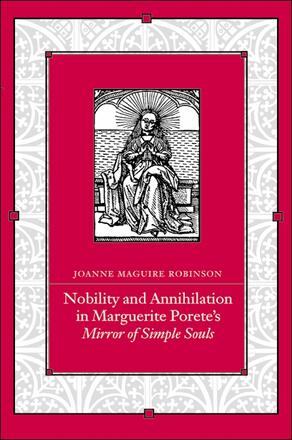
Nobility and Annihilation in Marguerite Porete's Mirror of Simple Souls
Alternative formats available from:
An in-depth examination of the work of this important medieval woman mystic.
Description
This first book-length study of Marguerite Porete's important mystical text, The Mirror of Simple Souls, examines Porete's esoteric and optimistic doctrine of annihilation—the complete transformative union of the soul into God—in its philosophical and historical contexts. Porete was burned at the stake as a relapsed heretic in 1310. Her theological treatise survived the flames, but it circulated anonymously or under male pseudonyms until 1946, and her message endures as testament to a distinctive form of medieval spirituality.
Robinson begins by focusing on traditional speculations regarding the origin, nature, limitations, and destiny of humankind. She then examines Porete's work in its more immediate historical and literary contexts, focusing on the ways in which Porete conceptualizes and expresses her radical doctrine of annihilation through contemporary metaphors of lineage and nobility.
Joanne Maguire Robinson is Assistant Professor of Religious Studies at the University of North Carolina at Charlotte.
Reviews
"Porete's work is crucial to the study of late medieval mysticism and Christian women's spirituality. Not only is this the only book-length study of Porete's work, but it will set a very high standard not easily surpassed." — Amy Hollywood, author of The Soul As Virgin Wife: Mechthild of Magdeburg, Marguerite Porete, and Meister Eckhart
"Porete's work is really the first time that annihilation and nobility, as a mystical motif, is found within a Christian milieu instead of a Sufi one. Eckhart and Kierkegaard kept coming to mind as I read about Porete's strong affirmation of the status of the individual soul in relation to God, an Eckhartian theme that is nevertheless expressed in a paradoxical language suggestive of Kierkegaard. This book will stimulate further thought and research besides making an important intellectual contribution and adding to our knowledge base." — Thomas Mether, University of South Carolina–Columbia